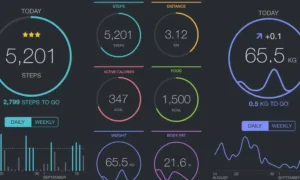Sales conversion optimization is the process of improving the user experience of a website or online platform to increase the number of visitors who become customers. Making changes to page layouts, navigation, and adding effective calls-to-action can achieve this. Moreover, A/B testing and personalization can be used to determine the best approach for engaging customers and improving conversions.
Did you know that AI can enhance sales conversion by analyzing customer data and behaviors to provide insights into their preferences and trends? With sales AI, businesses can identify potential customers, predict their needs, and create personalized experiences. It can also automate manual tasks, provide optimized product recommendations, and optimize pricing and discounts to increase sales conversions. We’ll cover its benefits in more detail and provide you with tips on how to leverage AI for more sales.
AI and Sales Conversion Optimization
AI has become an indispensable tool to improve sales conversion rates by offering a deeper understanding of potential customers. By analyzing customer data and identifying patterns, AI can make predictions about their behavior, enabling businesses to target them more effectively.
Through optimizing the customer experience, AI helps marketers create more effective campaigns, ultimately leading to higher quality leads for sales. AI’s multifaceted approach to sales conversion optimization is revolutionizing the way marketers attract and retain customers.
The Benefits of Implementing AI in Sales Conversion Optimization
AI assists in sales a lot of different ways. This includes maximizing revenue, identifying potential leads, increased efficiency, personalizing messages, automating lead qualification and follow-ups, improving customer segmentation, and forecasting sales.
For sales conversion optimization specifically, AI can aid in using predictive analytics to identify potential leads and deliver personalized messages. It can also assist in cross-selling, upselling, and maximizing revenue by recommending the best offers and discounts. Here are some of the key benefits:
Higher Revenue
If your sales team consistently receives a steady stream of high-quality leads, the key to boosting your business revenue lies in converting more of those leads into customers. With the help of AI, you can analyze customer data and behavior to uncover valuable insights and patterns that can inform your sales strategy and help you close more deals. By improving your team’s ability to convert leads and increase your conversion rate, you can turn those insights into real-world results and take your business to new heights of success.
Increased efficiency
Using AI in sales conversion can greatly improve a business’s efficiency by automating certain sales tasks. One example of this is Dialpad’s integration with popular CRM tools like Salesforce, which automatically logs call data without any manual input needed from the sales team. This not only saves time but also allows your team to focus on selling. By leveraging AI-based sales conversion, businesses can prioritize their sales activities, more effectively, which leads to better utilization of time and resources.
Personalization and better customer insights
By analyzing customer data, AI can reveal trends in customer behavior and purchasing preferences, which can be leveraged to recommend products and services that better suit their needs and wants. It can assist in identifying customers who are more likely to positively respond to specific offerings, allowing businesses to target them with more customized and effective upsell proposals.
Predictive analytics
Sales AI technology can help businesses predict future sales conversions by identifying patterns in sales data. This enables sales leaders to make data-driven decisions and stay ahead of the competition. It can include the success rate of marketing campaigns and the most effective times to run sales campaigns, as well as which products are likely to be successful.
How AI Can Improve Your Sales Funnel
Now that you understand how sales AI technology can provide valuable insights for making data-driven decisions and staying ahead of the competition, it’s time to explore some ways you can improve your sales funnel. Here are three key strategies you can use to optimize your sales process.
Optimizing lead generation
AI can help businesses identify potential customers and target them with personalized marketing messages. This can lead to better engagement and more successful conversions. An example of AI lead generation tool is Clearbit, a platform that helps businesses find information about their customers and automate personalized marketing to them.
Streamlining the sales process
Follow-ups, call logs, and lead generation management are all tasks that can be automated, freeing up sales teams to focus on more strategic tasks. By analyzing customer data, sales AI can create personalized sales pitches, identify promising leads, and automate outreach campaigns. This can lead to more effective engagement and higher conversion rates.
Improving customer experience
The more confident your sales team is in understanding your product and its features, it’ll be easier to sell to potential customers. For example, Dialpad’s real-time assist (RTA) cards can help sales teams and contact center agents feel more confident and prepared during customer interactions, leading to improved sales performance and better customer experiences. This reduces the likelihood of providing incorrect information to customers, especially for new reps that have recently completed their onboarding. It’s also great for objection handling.
When inbound and outbound sales teams are well-equipped to assist customers with their inquiries, it can lead to a positive customer experience. This, in turn, increases the likelihood of customers returning for future purchases, recommending the business to others, and leaving positive reviews or feedback. Consequently, the business can benefit from a higher customer lifetime value, increased revenue, and a more competitive position in the market.
Using AI to Analyze Customer Data and Behavior
AI can analyze customer data to identify patterns, predict needs, and recommend products. It can also automate customer service processes such as personalized recommendations and issue resolution.
Customer data collection
AI can analyze customer behavior and generate patterns and correlations between customer interactions and their decisions. It collects customer data through web analytics, surveys, interviews, and social media. AI can also use natural language processing to analyze customer conversations, social media posts, and other customer-generated content.
Sentiment analysis
Ever wonder how customers feel when they’re on a call with your sales team? AI can be used for sentiment analysis to analyze customer feedback, comments, and reviews. Dialpad’s live sentiment analysis can help sales managers listen to calls with negative sentiment and assist agents if necessary. This includes how people feel about a product, service, or brand. It shows sales managers and support teams where their attention should be focused and generates actionable insights with the help of AI.
Understanding customer behavior
AI can be used to understand customer behavior by leveraging machine learning algorithms that can be used to analyze customer data. This data can include customer purchase histories, website visits, social media comments, and more. AI-powered analysis offers the advantage of utilizing customer data analysis that significantly simplifies the process of gaining these insights, in comparison to manual methods.
4 Ways to Leverage AI for Your Marketing and Sales Strategies
By utilizing AI, businesses can personalize marketing and sales strategies by analyzing customer preferences and predicting future behavior. If you’re looking to take advantage of the benefits of AI for your marketing and sales strategies, consider the following four ways to leverage AI for your business:
1. Personalization through tailored sales pitches
Your leads may come from a variety of industries, company sizes, or have other attributes. Instead of a generic sales pitch, using AI to help generate customer-specific messaging that’s tailored to their preferences and interests can be much more effective and lead to higher conversions. It can also be used to monitor customer engagement and help identify opportunities for further personalization and targeting.
2. Personalization through recommendations
AI can analyze customer data and generate recommendations based on past purchases, browsing history, and preferences. It can also tailor recommendations based on the customer’s location, demographics, and other contextual information.
3.Personalization through chatbots
AI-powered chatbots can provide customers with a more personal, interactive experience that’s tailored to their needs and interests. This type of AI-powered tool can be used to recognize and understand user input, such as the user’s intent and the context of the conversation. Also, when a chat should be escalated to a sales agent, the chatbot can provide the agent with context about what was discussed so that the customer doesn’t need to repeat themselves and the agent can get up to speed quickly.
4. Using AI to Forecast Sales and Customer Trends
Since AI can be used to collect, analyze, and interpret large amounts of data, they are the perfect tool to help make predictions about sales and customer trends. For example, when your projections indicate a decrease in demand during the winter, you could reassign your team’s duties to focus more on lead generation during that period.
Choosing the Right AI Solution for Your Sales Processes
Determining your needs
Identify the Goals of your Sales Process: Before you begin looking for an AI solution, it’s important to clearly identify and understand the goals of your sales process. What are the desired results and what are the objectives of the process? This will help you determine which type of AI solution may best suit your needs.
Analyze Your Current Process: Take a look at your current sales process. What works and what doesn’t? What are the areas of improvement? This will help you determine which type of AI solution can best help you address those issues.
Evaluating vendors
Research Potential Solutions: Research the various AI solutions available to you and compare their features, capabilities and costs. Consider what features would be most beneficial to your sales process and which ones are unnecessary.
Test a Solution: Once you have identified a few solutions that may be suitable for your sales process, test them out. See how they work in practice and if they provide the desired results.
Integration with existing systems
Determine the appropriate AI technology: After the necessary data has been assessed, decide which AI technology is most appropriate for your existing process. Consider factors such as AI product type, machine learning models, and natural language processing options.
Implementation considerations
Implement and Monitor the Solution: Once you have found the right AI solution for your sales process, implement it and track the results. This could include creating datasets, training and validating models, and connecting the AI solution to existing systems. Make sure it is working as expected and that it is providing the desired results.
The Future of AI in Sales Conversion Optimization
Using AI in sales and marketing can significantly impact your company’s ability to shorten sales cycle. AI can gather and analyze customer data in real-time, providing insights into customer behavior, preferences, and interests. This allows companies to create personalized customer experiences, which are more engaging and effective at driving conversions.
By leveraging AI, companies can also identify which customers are likely to convert, and focus their marketing efforts on those customers. Additionally, AI can provide valuable insights on pricing optimization and timing strategies, further increasing the chances of conversion. AI has the potential to revolutionize the sales and marketing industry and provide companies with a significant competitive advantage.



































